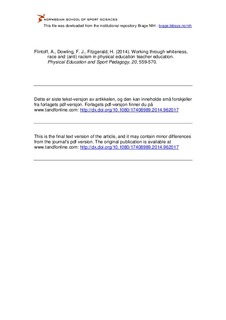| dc.contributor.author | Flintoff, Anne | |
| dc.contributor.author | Dowling, Fiona | |
| dc.contributor.author | Fitzgerald, Hayley | |
| dc.date.accessioned | 2016-02-02T10:08:35Z | |
| dc.date.available | 2016-02-02T10:08:35Z | |
| dc.date.issued | 2014-09-24 | |
| dc.identifier.citation | Physical Education and Sport Pedagogy. 2015, 20, 559-570. | nb_NO |
| dc.identifier.uri | http://hdl.handle.net/11250/2375642 | |
| dc.description | I Brage finner du siste tekst-versjon av artikkelen, og den kan inneholde ubetydelige forskjeller fra forlagets pdf-versjon. Forlagets pdf-versjon finner du på http://www.tandfonline.com/doi/full/10.1080/17408989.2014.962017 / In Brage you'll find the final text version of the article, and it may contain insignificant differences from the journal's pdf version. The definitive version is available at http://www.tandfonline.com/doi/full/10.1080/17408989.2014.962017 | nb_NO |
| dc.description.abstract | The persistent gaps between a largely white profession and ethnically diverse school populations have brought renewed calls to support teachers' critical engagement with race. Programmes examining the effects of racism have had limited impact on practice, with student teachers responding with either denial, guilt or fear; they also contribute to a deficit view of racialised students in relation to an accepted white ‘norm’, and position white teachers ‘outside’ of race. Recent calls argue for a shift in focus towards an examination of the workings of the dominant culture through a critical engagement with whiteness, positioning white teachers within the processes of racialisation. Teacher educators' roles are central, and yet, while we routinely expect student teachers to reflect critically on issues of social justice, we have been less willing to engage in such work ourselves. This is particularly the case within physical education teacher education (PETE), an overwhelmingly white, embodied space, and where race and racism as professional issues are largely invisible.
Purpose: This paper examines the operation of whiteness within PETE through a critical reflection on the three co-authors' careers and experiences working for social justice. The research questions were twofold: How are race, (anti) racism and whiteness constructed through everyday experiences of families, schooling and teacher education? How can collective biography be used to excavate discourses of race, racism and whiteness as the first step towards challenging them? In beginning the process of reflecting on what it means for us ‘to do own work’ in relation to (anti) racism, we examine some of the tensions and challenges for teacher educators in PE attempting to work to dismantle whiteness. | nb_NO |
| dc.language.iso | eng | nb_NO |
| dc.publisher | Taylor & Francis | nb_NO |
| dc.subject | teacher educators | nb_NO |
| dc.subject | whiteness | nb_NO |
| dc.subject | physical education | nb_NO |
| dc.subject | racism | nb_NO |
| dc.subject | narrative | nb_NO |
| dc.title | Working through whiteness, race and (anti) racism in physical education teacher education | nb_NO |
| dc.type | Journal article | nb_NO |
| dc.type | Peer reviewed | nb_NO |
| dc.subject.nsi | VDP::Social science: 200 | nb_NO |
| dc.subject.nsi | VDP::Social science: 200::Education: 280 | nb_NO |
| dc.subject.nsi | VDP::Social science: 200::Social science in sports: 330 | nb_NO |
| dc.source.journal | Physical Education and Sport Pedagogy | nb_NO |
| dc.description.localcode | Seksjon for kultur og samfunn / Department of Cultural and Social Studies | nb_NO |
